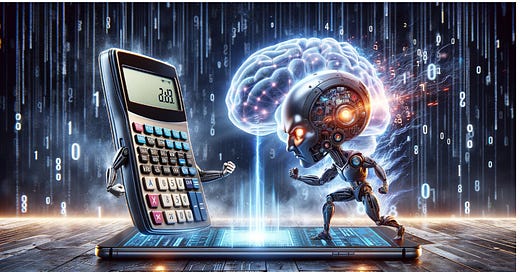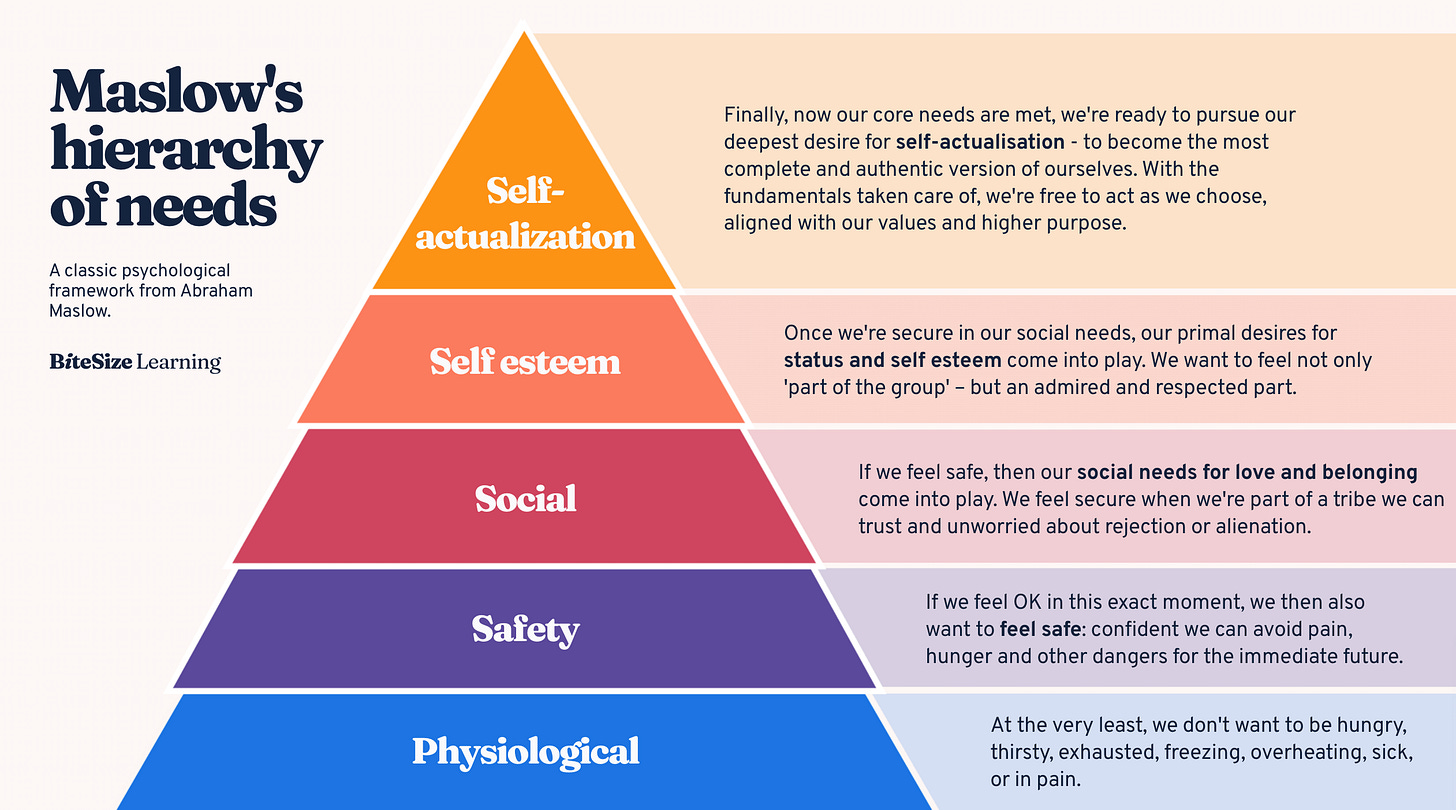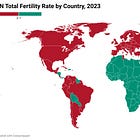ChatGPT Is Just a Fancy Calculator: Why AI Is Going to Create More Jobs, Not Less
Productivity and economic growth are a tide that lifts all boats, whether we're talking about agricultural machinery or artificial intelligence.
by Rod D. Martin
January 31, 2025
It’s been the week of AI, as China’s DeepSeek knocked $600 billion off Nvidia’s market cap (you should buy the dip), and the issue is raised yet again: how is this new technology going to change society, and will it cost me my job?
But we have lots of historical precedent. For every job destroyed, more higher-value jobs will be created. That’s the history of the whole last 300 years.
The fear that artificial intelligence (AI) will create mass unemployment and necessitate universal basic income (UBI) is based on a fundamental misunderstanding of economic history and technological progress. The concern is certainly not new; every major technological advancement has been met with similar anxieties, from Thomas Malthus to Reid Hoffman.
Yet history has repeatedly shown that automation does not eliminate jobs — it transforms them, making human labor more valuable (and better paid) in new and unforeseen ways.
Consider the shift in the American workforce since 1800. At that time, 83% of Americans worked in agriculture. Today, thanks to technological advances like mechanized farming and modern logistics, that number has collapsed to just 1.2%. Yet contrary to fears of mass unemployment, this astonishing, unprecedented transition did not render the majority of Americans destitute. Instead, it freed up human talent to pursue other, more meaningful, more valuable work.
And keep in mind: we’re talking about sharecroppers here, not skilled laborers. The world got better, but it got a lot better for the poor.
This same principle applies to AI. It’s going to make you radically more productive, not less. Richer too. And it’s going to free you up to use gifts you may not yet even realize you have.
Just wait till you see what it does for your grandchildren!
The Slow Adoption of Transformative Technologies
New technologies change society gradually. And people adjust to anything that’s gradual. If you see a police car up ahead on the Interstate and gently slow down from 80 mph to 65 mph, you barely feel it (and you might avoid a ticket).
If you run into a tree at 80 mph, the result is a bit different. It’s the rate of change that counts.

The introduction of AI is the same. When tractors were first introduced in the early 20th century, they did not displace horses or farm laborers overnight. Even in the 1930s — decades after tractors became available — there was still more equine horsepower than mechanical on American farms. The full adoption of tractors only happened after World War II, illustrating that radical labor-saving technologies take time to diffuse across the economy.
The result? The reduction of farm prices resulting from mechanization rippled through the economy, reducing the price and thus increasing the demand for virtually everything else. It also created vast new disposable income, especially among the poor who have to spend the highest percentage of their income on food. All of society moved up Maslow’s hierarchy, with money to address problems they’d previously had to just live with. They bought home appliances. They bought automobiles. They bought college educations for their kids.
And someone had to supply all those new demands. Former farmers streamed into the cities for a better life, and in the process created better lives for everyone else.
The same slow adoption curve applies to AI. While large language models (LLMs) like Grok and ChatGPT have demonstrated remarkable abilities, their impact on employment is almost certain to be evolutionary rather than revolutionary. AI is not eliminating work; it is giving human labor superpowers. New technology does not render human expertise or creativity obsolete: it enhances it, a lot.
The Productivity Paradox and Real-World Impact
In any case, even transformative technologies take years, sometimes generations, to produce significant economic shifts. The Nobel Prize-winning economist Robert Solow famously quipped in 1987, "You can see the computer age everywhere but in the productivity statistics." Despite the rapid advancements in computing throughout the 1980s and 1990s, their large-scale economic impact — especially on employment — took time to materialize.
That time gives everyone the chance to adjust. And the adjustment is upward, because the new technology creates opportunities that never existed before.
While AI tools have demonstrated efficiency in certain areas, they have not yet triggered the kind of widespread productivity boom that some fear or hope for. They certainly will. But not yet.
Historically, technology adoption has followed a predictable pattern. Initial enthusiasm is often met with fears of job displacement, but in reality, new technology creates new markets and industries, just as computers and the Internet did. AI will follow the same trajectory, coexisting with human workers for decades while slowly reshaping various sectors for the better.
Moreover, as Joakim Book points out, the total market size for AI in the United States is currently around $100 billion, a fraction of the $29 trillion U.S. economy. Even with optimistic growth projections, AI is not poised to displace a significant percentage of the workforce any time in the near future. Instead, it will be integrated into existing workflows, enhancing productivity rather than replacing workers en masse.
Lessons from History: AI as a Tool, Not a Replacement
For the most part, AI doesn’t compete directly with human labor anyway. AI is more akin to a calculator—an incredibly useful tool that enhances human capabilities rather than replacing them.
Grok or ChatGPT can certainly generate text, summarize information, and assist with research. But they lack creativity, originality, and contextual understanding. As Yann LeCun, Meta’s chief AI scientist, has noted, chatbots can produce fluent text, but they are often inaccurate and lack true innovation. This means that while AI can automate certain repetitive tasks, it still requires human oversight, critical thinking, and creative input.
As my friend George Gilder says, “computation is not comprehension”. AI extends human creativity: it doesn’t replace it. And while some traditional jobs may become less relevant or ultimately disappear, new roles will emerge that require human creativity, empathy, and problem-solving — qualities that AI cannot replicate.
AI reduces the time we need to do creative work, leading to a lot more human creativity and creative work.
Every wave of automation has led to the creation of whole previously unimaginable new job categories. When manufacturing jobs declined, the service industry exploded. When personal computing became mainstream, an entirely new tech sector emerged, employing millions of people in jobs that didn’t exist a generation before.
Instead of fearing mass unemployment, or stampeding voters into a giant Socialist UBI boondoggle — effectively putting every American on welfare — we should instead focus on how AI can free up human potential for more meaningful and innovative work.
Conclusion: A Future of Collaboration, Not Displacement
Just as mechanization freed millions from farm labor and allowed them to pursue other careers, AI will serve as a tool to enhance human capabilities, not replace them. In fact, if history is any guide, the real danger is that we won’t have enough people to do all the jobs AI will create.
AI is another step in humanity’s ongoing journey toward greater efficiency, creativity, and prosperity. Instead of fearing AI, we should embrace it as a powerful collaborator that can help us do more important things.
Well, until it rebels anyway.









The markets (which nosedived for a day) might believe in China's DeepSeek potential but I don't believe a word of what's coming out of China. Ever.
Well stated. AI seems to be a condensing tool, finding bits of information on a topic and regurgitating them in a coherent form. Saves time when researching a subject. But computers do not have the abilities of the human mind and body to actually conceive new thoughts. AI seems to be only as smart as it’s input.